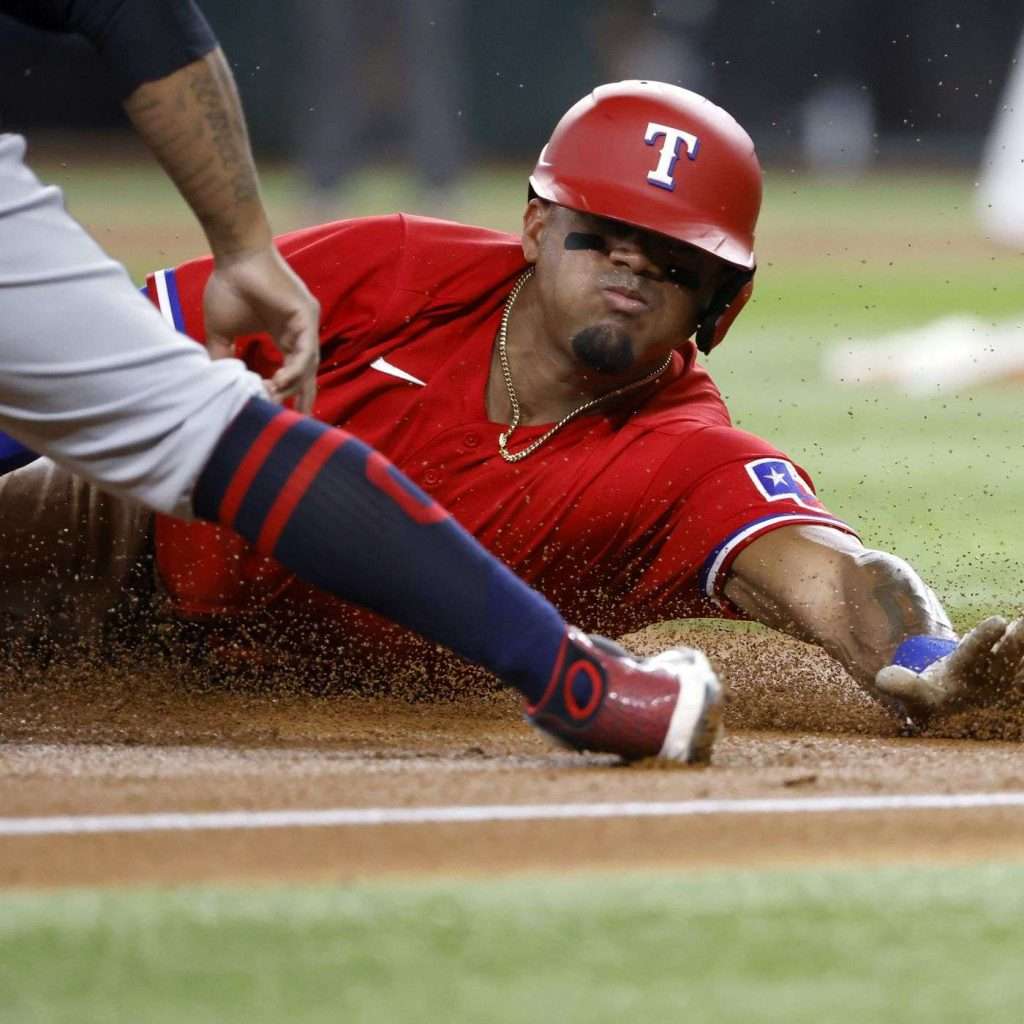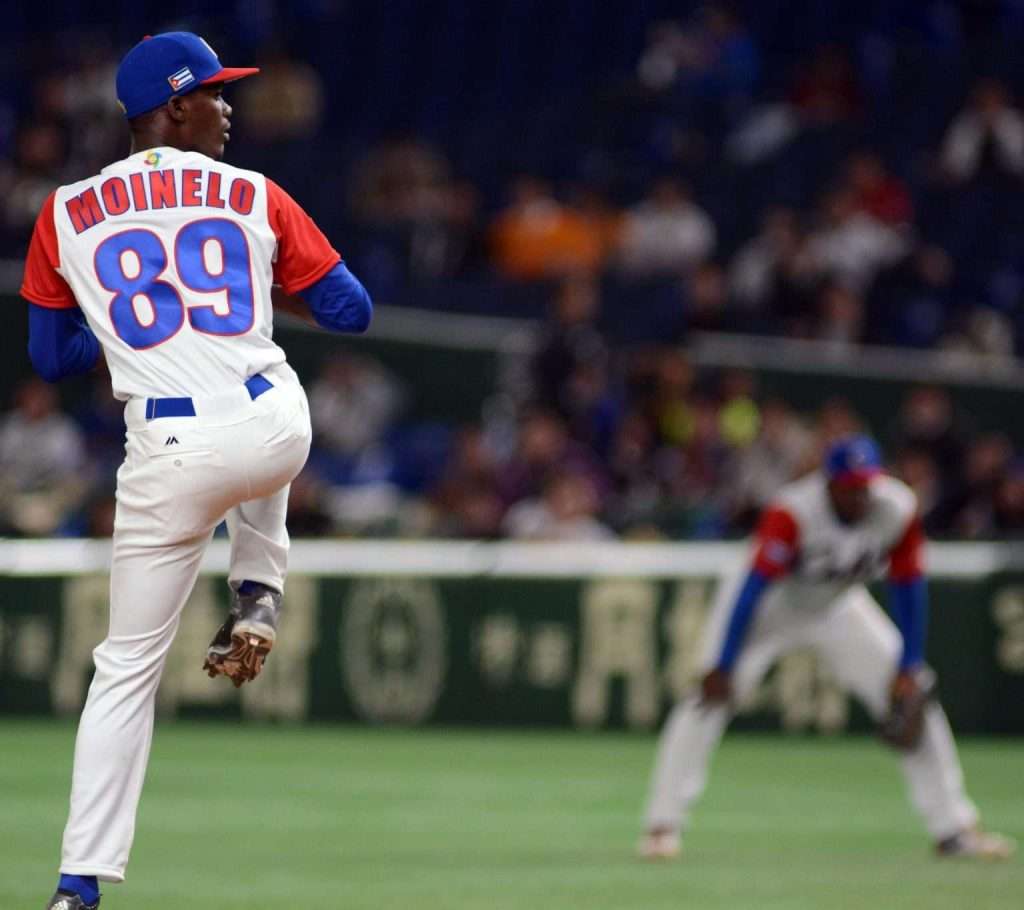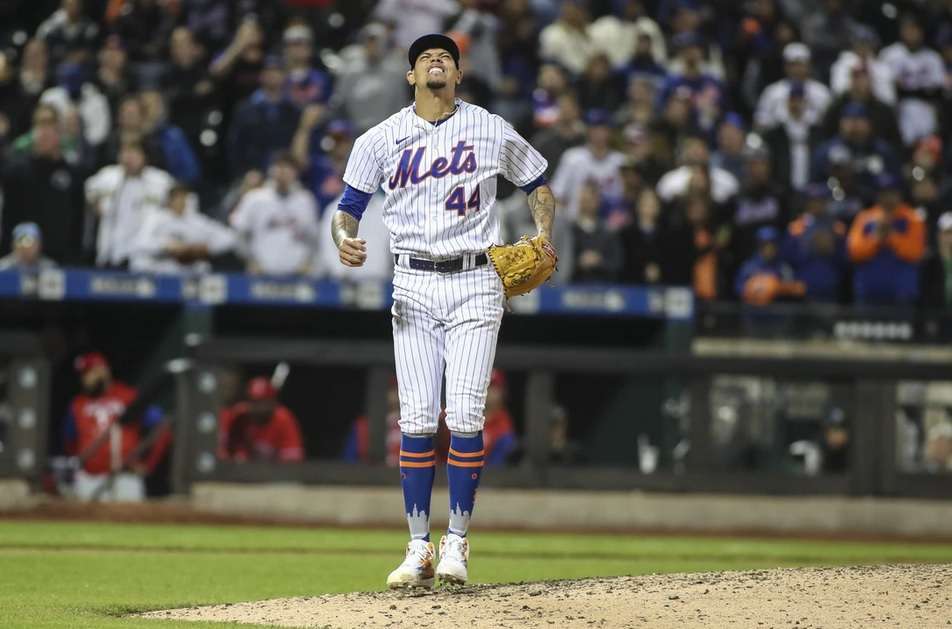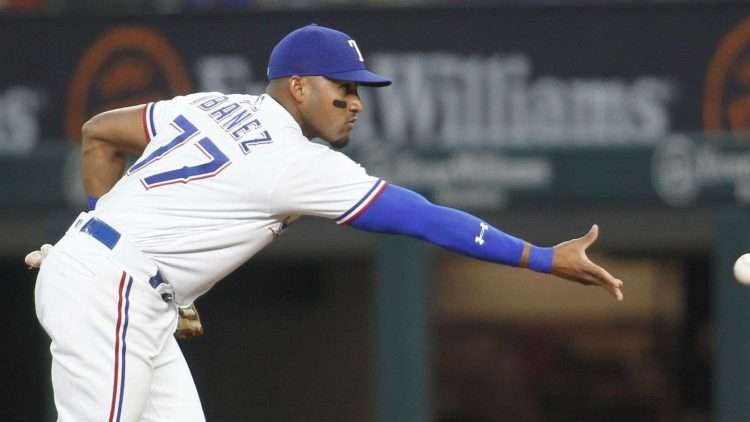On November 8, Juan Reinaldo Pérez Pardo, president of the Cuban Baseball Federation (FCB), said on national television: “There are laws that prevent players who play in the MLB circuit from playing for Cuba in an international event.” Without a single piece of evidence in his hands to support said sentence, the official dropped a bombshell that frozen the dream of seeing some Major League Baseball player wearing the four-letter suit.
Exactly six days later, without any changes in the convulsed political map between the island and the United States, the governing body of the sport of balls and strikes announced the call for two Cuban players who saw action in the Majors during 2022 and who are active in rosters of two franchises of that professional circuit.
“We are pleased to announce that Andy Ibáñez (Texas Rangers), Yoan López (New York Mets) and Elián Leyva (Hermosillo Naranjeros) will be part of Cuba’s preselection for the 5th World Baseball Classic,” said a tweet from the FCB published just at eight in the morning this Monday, November 14.
Regardless of the error in Ibáñez’s team (a week ago he was claimed by the Detroit Tigers), the announcement is unprecedented. After years of complaints, popular pressure, illusions, disappointments, silences and half-truths, Cuban Major League Baseball players will finally be able to represent their country in a major event without having to renounce their contracts in the United States or in any other country.
Nos complace anunciar que Andy Ibáñez (Ranger de Texas), Yoan López (Mets de Nueva York) y Elián Leyva (Naranjeros de Hermosillo) formarán parte de la preselección de #Cuba para el V Clásico Mundial de #Beisbol #BaseBall pic.twitter.com/2nn7gpnzkI
— Federación Cubana de Beisbol y Softbol (@CubanaBeisbol) November 14, 2022
The road to this point has been a tortuous one, with much suffering for the fans, who have seen their loved sport sink into the mire of humiliating results. But we cannot see this as the end of a process; this should rather be the beginning of a change of mentality that brings us closer once and for all to the immense Cuban baseball diaspora, frequently criticized and ignored due to the official position of one side and pressured by the sometimes aggressive and equally intransigent discourse from the other
With total certainty, we have reached a new scenario, perhaps promising, but we cannot be so categorical. This is why we propose to assess the impact and consequences that the announcement will have for the parties involved, as well as the projections of Cuban baseball for the World Classic with this new variable at play.
What implications will the announcement have on the future of baseball in Cuba?
In March 2017, Major League Baseball commissioner Rob Manfred assured the Prensa Latina news agency that for the fifth edition of the World Classic, the Cuban Federation would have “the possibility of analyzing the situation of summoning or not the players born on the island who are playing in the Majors.”
These statements opened up a range of possibilities for the reinsertion into the national squad of players belonging to MLB organizations, except for those who abandoned delegations in official tournaments. However, the Cuban sports authorities kept this ruling out of their discourse, especially after the administration of U.S. President Donald Trump canceled in April 2019 the agreement between the FCB and MLB, which opened a window to normalize and regulate the flow of Cuban players to the Majors without the need to emigrate.
Based on that disastrous decision the process closed again. Despite the latent need to appeal to the emigrated players to at least save their pride in international competitions, the sports officials on the island grabbed a perfect justification and launched a very calculated script: saying that there are intentions to summon the so-called “legionnaires,” although in reality that option was not considered objectively.
The clearest example occurred before the Pre-Olympic of the Americas last year, when FCB officials publicly expressed their willingness to summon several players hired on their own in the Mexican League. Those players were contacted, procedures were carried out, but in the end, they were discarded without any type of convincing explanation.
That has been the modus operandi of the baseball authorities in Cuba in recent years, in which the only sign of openness and flexibility has been the reintegration into the National Series of some baseball players residing abroad, but not before going through the process ― not always expeditious ― of repatriation as an essential condition to play on the island’s diamonds.
Fortunately, something seems to be changing in the leadership of the national sport, although we do not know if it is real will or despair. In any case, it cannot be denied that the call to Andy Ibáñez, Yoan López and Elián Leyva and the negotiations to summon other players mark a before and after and represent an essential step in a not so favorable context.
The most important thing for Cuban baseball now is not to stop or make do. It is vital to exploit the convocation capacity in all directions, because our diaspora is huge when it comes to baseball. You have to talk to everyone, starting with the Major Leaguers, and if they don’t accept the call for the most diverse reasons, well, there are many more possibilities on the table.
The question, I insist, is never again to sell that arrogant image that has isolated us so much, and to demonstrate a total willingness to open up, that we really want and understand that it is necessary to summon professionals. That path will probably lead us tomorrow to receive a positive response from those who did not want to come today.
Of course, none of this is going to be possible if there is discrimination in the process. Right now, Cuba eternally punishes those who abandoned delegations and measures all those players with the same yardstick, when we know full well that not all of them left in the same circumstances or at the same time.
Whoever left a delegation before throwing the first ball, who left their teammates “hanging” before competing, did not behave in the same way as those who played until the last out and served the very long punishment of years without returning to their country; they could well be considered for a national team again if they show willingness. That would be a true demonstration of unity in times of maximum polarization.
What implications will the announcement have for the players called up?
In the FCB tweet announcing the call for three professional baseball players with no ties to the Cuban sports movement, one user wrote: “our baseball and people deserve the best and the best is in MLB.” Two comments below, another person said: “what a lack of respect and values of those players.”
There is probably no better way to illustrate the crossroads that these players who have said “yes” to the Cuba team are now at, especially Ibáñez and López, who maintain ties to Major League Baseball organizations and reside in the United States. Right now, they are in the crossfire and will have a heavy load on their shoulders for a long time to come.

Much of this burden comes from the most radical sectors in the United States itself, where a standard proliferates: if you say “yes” to the Cuba team, before playing, you are aligning yourself with the Federation and, therefore, with the government of Havana.
It is very difficult to ignore this idea, which has spread like wildfire on multiple platforms, even in the voice of some players who openly oppose the prevailing system on the island.
Unfortunately, the attacks don’t stop there. Ibáñez, López and Leyva are also accused of accepting the call of the FCB when other colleagues of theirs do not have the same opportunity, for example, the so-called “deserters,” who do not count for the Cuban authorities for having abandoned delegations.
In addition, many people do not understand that these players have accepted the call after being ignored for years by the entity that now wants to have their services. In this, there is part of reason, because they have been called traitors, perhaps not openly, but the sentence has been there, very underhanded and impregnated in the official discourse.
It is difficult now to be in the shoes of Ibáñez, López and Leyva, who, in any case, have decided to embark on a path full of challenges and demons. They have put forward the idea that playing for the Cuba team, in the first place, means playing ball for the millions of fans throughout the world and not for a government or a political party. Cub’s World Classic team is, inevitably, the team of the people, the team of those who have been longing for years to see their best players wearing the same jersey. They have understood it that way.
Will more players come to play with Cuba in the World Classic?
For the first editions of the World Baseball Classic, Cuba never showed the intention of calling its players from the Major Leagues or who emigrated to other latitudes. In 2006, when the event began, the island still had the potential to play against professionals, while in 2009 and 2013 it competed with teams full of talent, several of which later established themselves in the MLB.
But beyond the strength of Cuban baseball in those years, resorting to the émigrés for the famous ideal of the free ball against the slave ball was never thought of. It was based on Fidel Castro’s words in 1962: one day it will be seen how “the free athlete can beat the exploited athlete, the athlete who cannot be sold in the market nor can he be sold to capitalist companies, can defeat the athlete who is subjected to these humiliating conditions without any kind of moral incentives.”

Sixty years later, Juan Reinaldo Pérez Pardo assured on national television that the “hiring of athletes is something that is here to stay.” Not so long ago, no one in Cuba would have dared to be so blunt on a taboo subject, but times have changed and today that sentence conforms to a reality that we have hidden for decades.
Perhaps the Cuba team for the 2023 World Classic is the clearest example of the impact that the hiring and links of Cuban athletes have with the professionalism that we demonized before. In outline, it is very probable that the selection is mainly made up of players who today play in contracted circuits, while the representatives of the National Series on the squad can be counted on the fingers of one hand.
Andy Ibáñez, Yoan López and Elián Leyva are just a sample button. Before them, there were Raidel Martínez, Yariel Rodríguez, Liván Moinelo, Ariel Martínez, Yurisbel Gracial, Alfredo Despaigne, Yoenni Yera, Erisbel Arruebarrena, Yadir Drake, Carlos Juan Viera, Raico Santos, Roel Santos, Yordan Manduley, Yoelkis Guibert, Pedro Álvarez, Marlon Vega, Yosvany Peñalver, Frank Abel Álvarez, Guillermo García or Pedro Pablo Revilla, who maintain ties with the FCB, but spend most of the year playing in professional leagues in Japan, Mexico, Canada or Nicaragua.
To this large group of potential athletes that will make up the national squad for the Classic, we should probably add others. Only hours after the FCB confirmed the presence of Ibáñez, López and Leyva in the shortlist, journalist Francys Romero reported that Josuan Hernández, another Cuban living in Mexico, had also accepted the call from the island’s authorities.
Weeks ago, the specialized site Swing Completo revealed the words of a former major leaguer like Yasmany Tomás, who acknowledged that he had been called and also expressed his willingness to join the Cuban ranks to play baseball “wherever.”
So, we can expect more names in the coming days and months before the Classic, because obviously the FCB has been moving on different fronts to summon more professional players in order to present a more competitive team and try to avoid another international ridicule.
In any case, it is worth noting that excessive optimism is not convenient, because all players are going to be under constant pressure to say “no.”
How does this announcement change Cuba’s chances in the World Classic?
In principle, Cuba is shaping a squad full of professionals, but without its most talented and impactful exponents, which places us in a not so favorable scenario to challenge China Taipei, Italy, the Netherlands and Panama, nations that must arm themselves to the teeth with their best figures from MLB, Minor Leagues and the Asian circuits.
Of the last three called up, Andy Ibáñez brings versatility in the infield and speed in the offensive order, but he is coming off a disastrous year in the United States. He started the season in the Majors and fell far short of expectations, so in early June he was assigned to the Rangers’ Triple-A branch, where he didn’t shine either.

Yoan López, for his part, will be an additional arm for the bullpen, perhaps the most consistent area of the Cuban team for the Classic due to the presence of Raidel Martínez, Liván Moinelo and Yariel Rodríguez. The player from Pinar del Rio didn’t fare well in 2022 either, finishing with a high 5.73 ERA in eight outings with the Mets.
Meanwhile, Elián Leyva must occupy a position as opener, making the most of his experience. The right-hander won the pitching Triple Crown in the Mexican League four years ago, but time has passed and he is no longer the same. Either way, the Cuban rotation has been a headache of late and could use an arm with a run in professional baseball.
However, I insist, these three additions are not going to make a considerable difference in the fate of the Cuba team if other professionals do not arrive, especially since the games are expected to be very demanding. El Classic has won the bill and is already widely supported by many active stars, which has motivated other players to take the step to compete at the highest level of intensity.
In this scenario, the fight to demolish myths has to continue, the only way to look to the future with hope. Of course, let’s not forget the mistakes of the past along the way or postpone critical debates about them, because then we will be condemned to repeat the same mistakes over and over again.










